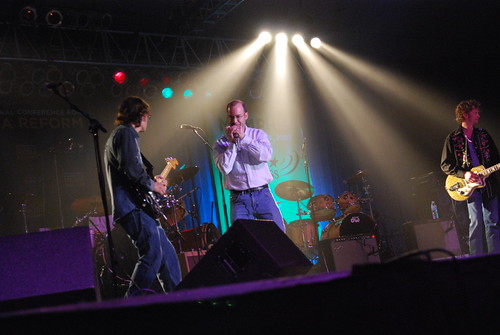A study released on Wednesday by Free Press and the Center for American Progress lays bare what is obvious to many: Talk radio is a chorus of right-wing voices.
"The Structural Imbalance of Political Talk Radio" found that 91 percent of weekday talk formats are given over to right-wing programming. No surprise, really, but good to have further evidence.
What's more revealing is the report's discovery that radio's absence of real fairness and balance is a byproduct of problems in the way federal regulators dole out access to our public airwaves.
Big media lobbyists have struck a cozy bargain with allies on the Federal Communications Commission to gut ownership limits that protect localism, diversity and competition on the airwaves. For their part, the FCC has shown almost complete disregard for the public interest requirements written into broadcasters' licenses.
It's the Structure, Stupid
Here's the rub. The lack of ownership diversity spawned by this structural failure at the FCC is perhaps the single most potent ingredient in the often caustic right-wing tilt of the radio dial.
Free Press analyzed all 10,506 licensed commercial radio stations to find that stations owned by women, minorities or local owners are statistically less likely to air conservative hosts or shows. But stations controlled by group owners -- those with more than three stations in a single market or that own stations in multiple towns -- were statistically more likely to air conservative talk.
"Off the Dial," a Free Press report released earlier this month, revealed a dismally low level of minority ownership of radio stations in America. While racial or ethnic minorities account for one-third of the U.S. population, they own just 7.7 percent of all commercial broadcast radio stations. (Women, who make up half the population, own less than 6 percent of full-power stations.)
The Free Press report also found that no minority-owned stations aired "Imus in the Morning" at the time of its cancellation. Moreover, minority-owned stations and minority-owned talk and news format stations were significantly less likely to air "The Rush Limbaugh Show."
Taken together, the stark findings raise legitimate concerns about whether the companies licensed to broadcast over the public airwaves are serving the listening needs and interests of all Americans.
Right-Wing Knees Jerk
 Malkin: Spreading fear over the facts |
The policy proposals are in no way a call for censorship or the removal of any voice from the airwaves. On the contrary, they would result in more localized and diverse types of programming. Their aim is to restore the pact between broadcasters and their listeners: In exchange for licenses worth billions of dollars, you will address the concerns of the community across which your radio signals are beamed.
This simple prescription for more diverse, democratic and accountable radio programming has set off a firestorm among the more rabid wing of the conservative blogosphere.
The release of the report over at ThinkProgress.org was flooded by nearly 4,000 comments, most from the angry right. Their near total failure to address the substance of the report was matched only by the shrillness of their comments.
The hyperventilating pundit Michelle Malkin, who's known the world over for routinely getting things wrong, joined many of her colleagues in mis-characterizing the report and its authors as calling for the Fairness Doctrine to be restored.
In reality, they never argue for a return of the Fairness Doctrine, which required broadcasters devote airtime to important and controversial issues and provide contrasting views on these issues. The report specifically states that the Fairness Doctrine "was never, by itself, an effective tool to ensure the fair discussion of important issues."
More Voices a Rallying Cry for Everyone
The report has clearly touched a raw nerve among these folks. Perhaps their attack is prompted more out of fear than anger. Fear of a media system that better reflects the diversity of the Americans it's supposed to serve -- and one that is less of an echo chamber for those that now control what millions of people hear when they scan the dial.
"Our goal is not less speech, it's more speech," said Ben Scott, policy director for Free Press and co-author of the report. "We want more voices on the radio."
Isn't conservatism all about localism? What could be more local than radio programming that's rooted in the community?
This sort of independence and diversity in the media should be a rallying cry for true conservatives and not cause for division and alarm.




